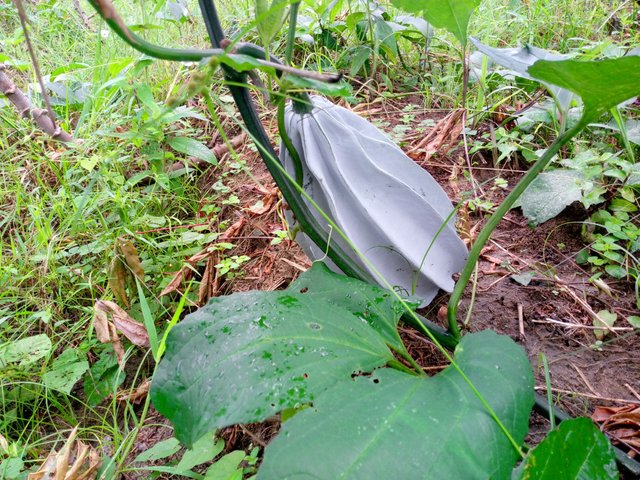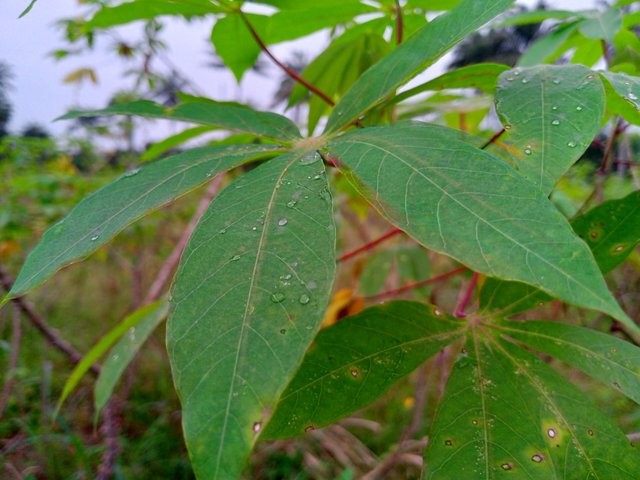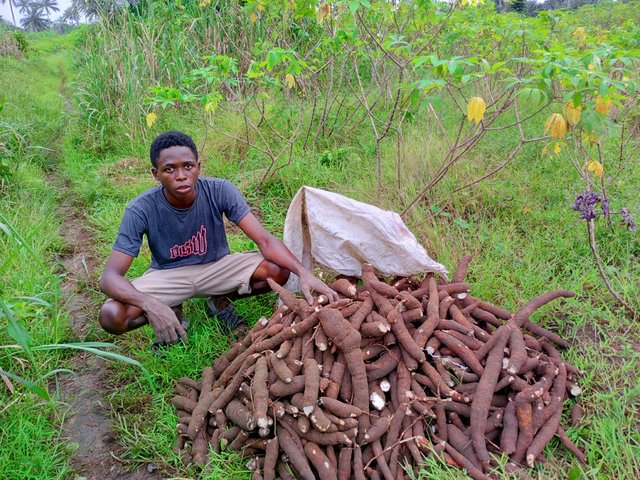SEC | S20W3:"Identification and Elimination of Crop Pests
The major crops I farm as an African youth are cassava, pumpkin, plantains, melon, maize, and cucumber, but presently, I don't know if the season for most of them has passed since I don't do greenhouse farming.

On visiting my cassava farm today, I noticed some pests like mealybugs, which affect most of the stems and cause them to dry off; since my cassava has nodes that grow and the other falls off, I think we have a very favourable condition for cassava when they pass their early stage. The major pest in the cassava planting early stage is termites. In the period between the dry and rainy seasons when cassava stem is planted, the farmer needs to recheck from time to time because some holes will not have cassava leaf spring forth, which causes it to be termite, and this depends on the condition at that time; termite destroys the stem retarding growth, and when the cassava is fully grown, rodents destroy most of the root crops. You can identify that in a farm that is weeded as boreholes are at most root level and splashes of cassava peels on the floor.
Pumpkins are very delicate, and this pest can easily destroy them. If they are not treated, if you notice a borehole in your pumpkin leaves, then it is the aphid that does that, and if you notice a sore stalk that connects the cucumbers with the long stems, then it is the cucumber beetles at work. I notice this in my pumpkin, and even the root gets hurt by this pest most times.
The fall of plantains in my backyard is not only because of the winds but also because of rodents and termites that find the root of this plant as their home; if a very healthy plantains falls, then rodents could be said to contribute to this.
Birds love plantains and bananas, and if they notice that they have attained maturity, they will bore holes in them, reducing fruit quality. These are the few I observed.

I will give you a list of the chemicals that will help curtail this pest.
Pest+Plant+Chemicals
- mealybug+cassava+ insecticidal soap (safer soap), pyrethrin sprays (pyrethrum), deltamethrin (e.g., Decis)*
- Termites+cassava+chloropyrifos
- Stem borers+pumpkin+maize deltamethrin, lambda-cyhalothrin
- Cucumberbeetles, aphids+pumpkin+permethrin (ambush), pyrethrin sprays, and insecticidal soap.
- Rodents+plantain+chlorpyrifos, imidacloprid.
Among others are setting traps, especially for those edible bush animals, and I would like the use of rabbit urine, especially for pumpkins and maize plants; they serve as repellants and, at the same time, are not harmful to the plant but provide nutrients.
I thought of a method that could be nice but at some point may not effectively curtail pest control. Let me share. Insects are attracted to glittering substances, so if you have a basin full of water, then place it below your maize crops or plants that you know pollination occurs, and the insect you will find in it will be unimaginable.
Another way is by creating a bait trap that has a sweet substance in it—a substance that the pest needs to be controlled with love—then keep it open and make sure your string is set in such a way that even though a smaller amount of the insect is on the bottle, it will close. If numerous bottles are on the farm, you are sure of trapping numerous insects.
The reason why I love biochemical application in my farmland is because it can increase crop yield, and it can selectively attack destructive pests and leave the ones that are beneficial out of it.
- Vegetables: I plant vegetables in my backyard garden, and for some time now, applying biochemicals has helped me in curtailing the loss I had before; imagine when it comes to the time your pumpkin cucumber yield gets destroyed by pests and falls off.
- Corn: biochemicals capable of destroying selective pests like aphids can be used on our maize plants of corn to reduce or serve as repellant to them; most times, biochemicals are made to repel these pests from attacking our plants and their products (fruits).

I don't know much about cassava biochemicals, but I have bought chemicals that could be spread on the ground level, and they help in the destruction of grasses; this will not affect the tubers if this is possible. I think all production biochemicals based on their targeted mode of usage are possible.
I live in the southern part of Nigeria, and crops like tomatoes and rice are not that popularly planted but in reserved places where the government makes provisions for them because of the cost of taking care of them.
PEST-PLANT-PESTICIDE
Tomato Pinworm +Tomatoes +Lambda-cyhalothrin and Cartap
Rice Yellow Mottle Virus+Rice Imidacloprid and Thiamethoxam

Read the instructions on the container and ensure you apply according to timing; don't skip any. The amount to apply is always written in the container, so be sure to follow this carefully. I got these few tips from my cousin, who is a student in the animal science department, and the tip is from his departmental local agriculture research journal.
I would love @whizzbro4eva @bessie2023 and @joojoo78 to stop by.
Upvoted. Thank You for sending some of your rewards to @null. It will make Steem stronger.
Observations and suggestions:
Mealybugs are most common in cassava. Decis is a very good insecticide for pest control. Care must be taken when spraying with Decis. Previously, I had not heard about the use of rabbit urine anywhere because there are not so many rabbits in our country. Pest control by baiting is a very good method as it has no site effect. Is it safe to use cartap in cassava?
Feedback:
Cartap is it a kind of trap too
Nice write up, thumbs up for you and success in the contest 🤗
X promotion link https://x.com/nsijoro/status/1842376323915776361?t=RLnefUwfD55lHBGYfesAwA&s=19